It is difficult to visually depict memory. It’s not until sleep that our brains siphon through the massive amount of information that fills our heads in a waking day. And, even after the cataloging efforts of sense-making we are left with multi-layered snapshots which evoke in most part emotional reactions to sights, smells and sounds. A memory of a street corner can contain an overall sense of space, mixed perspectives, tear outs and clippings, of figures, shadows, smells, colors, lines, animals or trash all of which seem to be scattered on top of each other. Memory is not linear. The recall of memory is in essence a wandering line. A line that moves while it creates, overlaps and often erases.
In thinking about memory, and its potential recreation, I have found myself visiting the work of Larry Bob Phillips. Larry Bob is creating a similar experience to that of the recollection of memory in his work, however, he is creating the experience itself, the overwhelming effect of the moment in his wandering line.
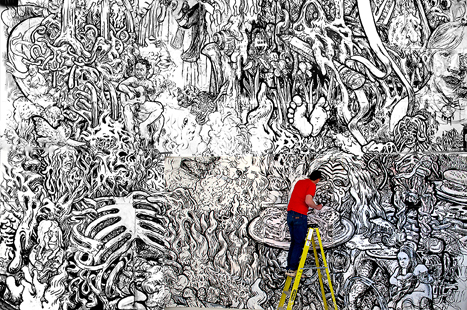
Pancake Supper
Ink on multiple sheets of paper
2010
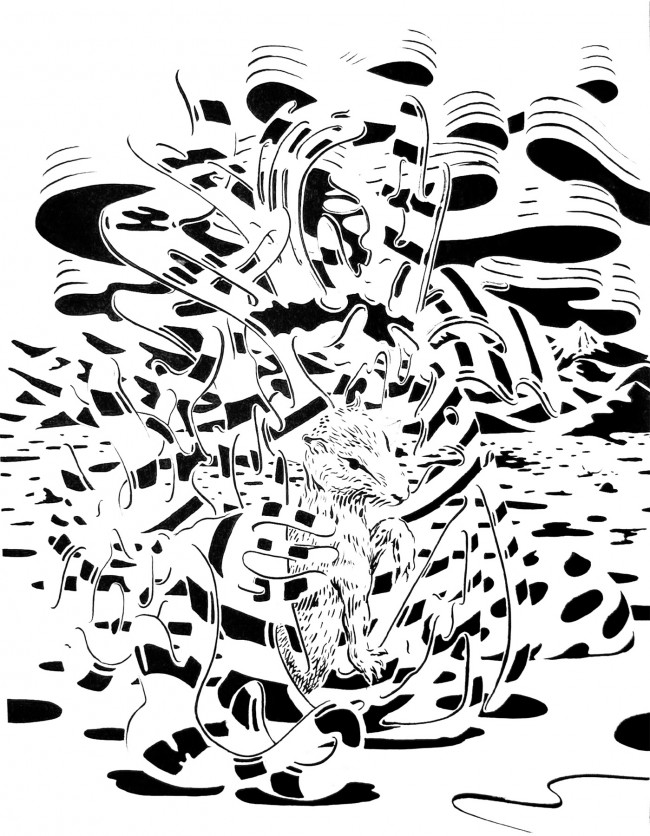
Ferret
Ink on Paper
38″ x 50″
2008
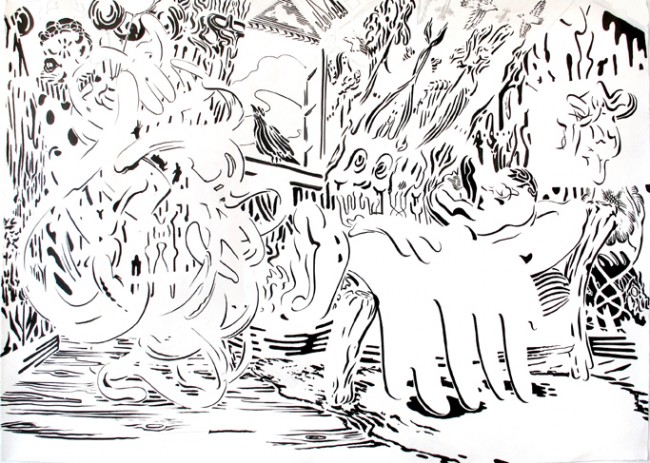
Poet
Ink on Paper
20″ x 30″
2008
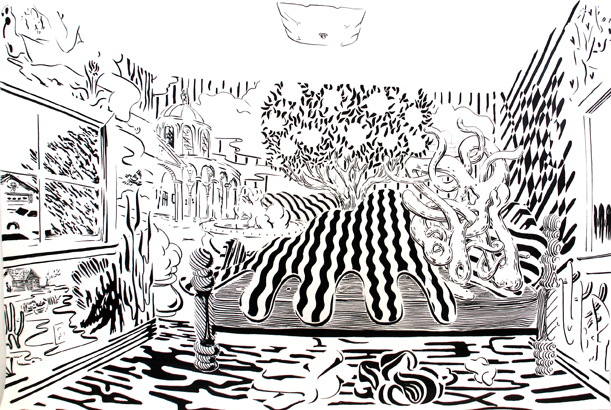
Poetess
Ink on Paper
20″ x 30″
2008
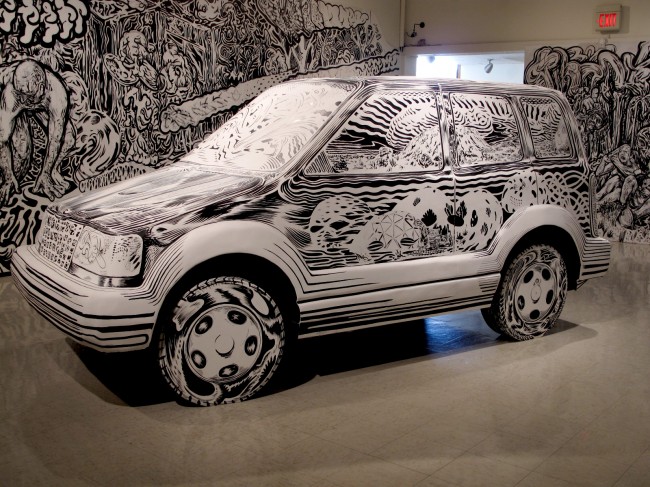
Cartoon
Ink and Paint on Wood, Foam and Plaster
13′ long
2010
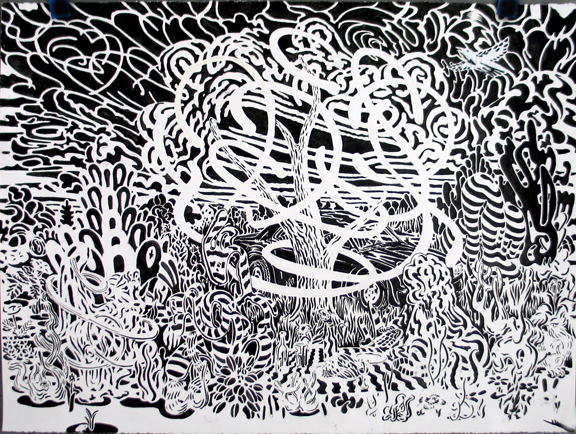
Tree
Ink on Paper
22″ x 30″
2008
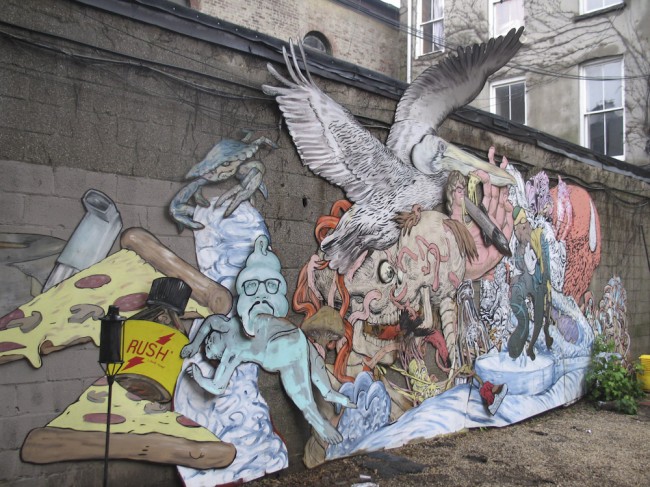
Wiggle Room
(installed at Nabobs Exhibition)
Ink and Paint on Plywood
40′ long
2012
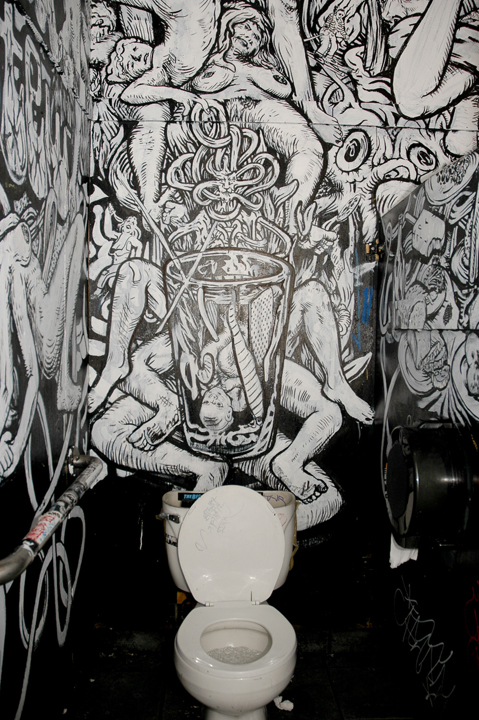
Pissteen Chapel
(mens bathroom at Atomic Cantina)
Ink and paint on Walls
larrybobphillips.com
Bio:
Statement
I’ve been trying to make still images that move or change as you look at them. As a student it was grilled into me that the great painters had sound and motion, and necessarily time, in their work, it must have worn off. Because it has been important in the past decade to make work that engages the viewers sense of curiosity and rewards their efforts to understand a complex picture with an even more complex picture.
At first this was a narrative complexity, where what was happening maybe changed or at least revealed itself over time by clever pictorial devices, clues and jokes.
Later I developed stylistic and decorative elements that were already being used a lot by other artist like wallpaper designs but for me they became a complicating screen that held a more conventional picture within it. Like a kaleidoscopic lens held up to a genre painting.
This work shifted when I switched form pencil to ink. In the earlier pencil pieces the eyes adjustment to the low contrast situation meant a different mechanism than these new black and white optical effects that invaded and more aggressively challenged the eye.
After grad school in 2007 I wanted a big project and decided to address scale, id been thinking about cave painting and ceiling frescoes and realized that painting was a largely architectural affair for much of its history and that it’s designation as a window or an object were not its only aspects. I began to suspect that Paintings effects on architecture could be erosive, claustrophobic, or expansive, challenging our sense of scale. I contracted with a punk rock club to paint their bathroom, a two week project turned into a seven month residency and resulted in work that surprised myself and every peeing patron in what was arguably the crappiest bar in town. It took so long to paint because for the first time I had a situation where I was really in control of the viewer, I could follow him into the toilet stall and show him a bunch of cartoon food!
Most recently the addition of color has changed the large work into monumental comics mixed with sign painting adding new possibilities to this work. A 2011 residency at RECESS in New York brought the emotional aspects and the literality of color into the work. Color in a way brings things full circle. The black and white work allowed for a certain ambiguity of space: a creeping confusion, but the color identifies objects clearly and therefore narrative and meaning again are being invoked to provide that slow-read for the view, the sense that “something’s going on here…..â€.










